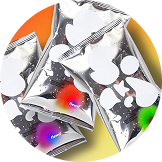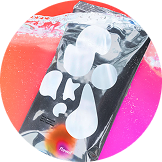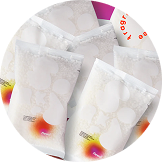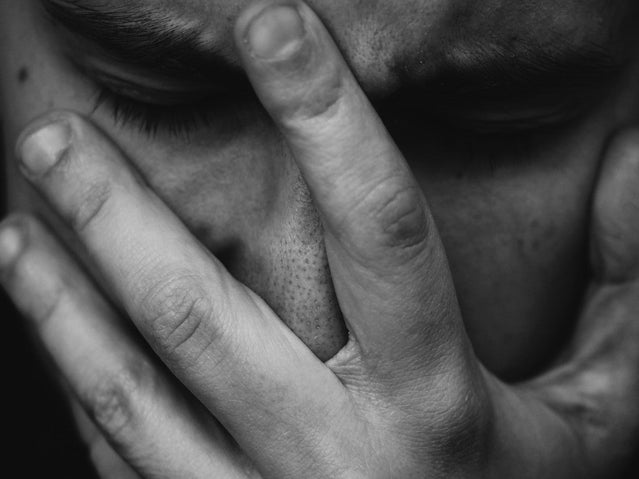ADHD fatigue is that unmistakable drained, foggy feeling that shows up before you even start your day. You’re gassed after answering two emails or trying to figure out what to eat.
And no - more sleep isn’t the answer. We’ll show you how to treat ADHD fatigue the smart way, because this type of exhaustion runs a whole lot deeper than just needing extra rest. You don’t have to overhaul your life or rely on that vicious cycle of stimulants and caffeine, either.
We’ve developed our energizing bath soak to help you fight fatigue head-on with bioavailable magnesium chloride, potassium, tryptophan, and B6. Learn more about how our magnesium bath soak can help you beat brain fog, catch more physical energy, and restore restful nights!
“The anti fatigue Flewd bath treatment is my new favorite! It smells sweeter than the others but still earthy. The scent doesn't linger. It makes me feel so refreshed after a long day of work. I suffer from lupus and this really helps!” - Shelby
“I love Flewd they are all fantastic I take 2 of these baths a week, the Ache one after pilates is wonderful. When I travel I notice a decline in my sleep after I miss one. The new fatigue one is fantastic!” - Bryce
“For anyone that is anxious, irritable, tired, depressed, sad, burdened….TRY THIS SOAK! It has literally been a gift from God and has made my anxiety almost non-existent.” - Jennifer
Key Takeaways on ADHD Fatigue
- ADHD fatigue is caused by mental overload, poor sleep, and emotional burnout.
- It shows up as brain fog, inconsistent energy, forgetfulness, and feeling exhausted after rest.
- Manage it by tracking your triggers, fueling your brain, and supporting executive function with tools (not just willpower).
- Our Fatigue-Defeating Soak is a powerful way to refuel depleted systems with magnesium, B6, and other essentials that ADHD brains often lack.
Can ADHD Cause Fatigue?
First things first - can ADHD cause fatigue? Short answer, yes. And as we describe in our comparison of fatigue vs tired, this is not something that goes away with a nap or a full 8 hours in bed. It’s a deep, chronic exhaustion that stems from how your brain works overtime to manage everyday life.
A lot of people assume ADHD means “hyperactive” - but that’s just part of the picture. Under the surface, this condition strains mental resources every waking hour. You’re constantly juggling attention, organization, emotional regulation, sensory input, and motivation with a limited battery.
Having to redirect focus, suppress distractions, stay on track, and regulate emotions can leave adults and children with ADHD feeling wiped out by noon. Even passive tasks like sitting in a meeting or watching a class can feel surprisingly draining.
Whether it shows up physically or mentally, it’s frustrating - and it holds you back from feeling and performing your best at whatever the day calls for. But what does ADHD fatigue feel like?
What Does ADHD Fatigue Feel Like?
Just like PCOS fatigue, it’s not a matter of being “tired.” It’s a lot deeper than that. Signs you (or your child) are struggling with ADHD fatigue include:
- Mental fog that makes it hard to finish a thought, hold a conversation, or recall why you walked into a room.
- Physical heaviness, where your body feels sluggish even if you’ve had enough sleep.
- Emotional flatness, like you’ve run out of fuel to care, engage, or respond.
- Overwhelm from simple tasks, like checking email or prepping dinner.
- An inability to get going, even on things you want to do.
We’ve also found that this form of fatigue can show up in the form of irritability, avoidance, or zoning out rather than verbalizing “I’m tired” - especially for kids. Adults see it manifest as procrastination or burnout.
The problem is, fatigue from ADHD is often misunderstood, even by those who have experienced it for years and simply chalked it up to “life.” It doesn’t follow the typical rules of rest and recovery, and caffeine or willpower alone won’t make a difference.
Why Does ADHD Cause Fatigue?
Don’t worry, we’re going to show you how to treat ADHD fatigue in just a moment. But understanding the root cause is the first step towards correcting the problem. So, why does ADHD cause fatigue?
Mental Overload From Task Switching and Executive Dysfunction
People with ADHD struggle with executive function: the brain’s ability to plan, organize, prioritize, and complete tasks. That’s why something as simple as getting ready in the morning can feel like solving a logic puzzle with missing pieces.
Switching tasks, deciding where to start, or even remembering next steps can create a constant low-level stress response. This never-ending mental load creates fatigue as your brain spins its wheels all day long.
Sensory Sensitivities and Emotional Regulation Drain Energy
You’re probably well aware that some people with ADHD are more sensitive to noise, light, texture, or even social interactions. These stimuli can take a toll on your mind, creating a sense of overwhelm.
Add in difficulty regulating emotions (like frustration, rejection, or anxiety), and the result is a brain that's on high alert far more often than most. Constantly filtering out distractions or managing complex emotions zaps energy more than you may think.
Stimulant Medications and the Rebound Crash
Adderall and Ritalin can be a saving grace for helping you focus and reducing impulsivity. But they also have that notorious “rebound” effect as they wear off. The ensuing crash can feel like someone pulled the plug. It’s sudden, sharp, and draining.
Poor Sleep Hygiene and Circadian Rhythm Disruption
It’s no secret that ADHD can have an adverse effect on your sleep habits. You might struggle to fall asleep, stay asleep, or wake up feeling refreshed. Delayed sleep phase syndrome is really common among ADHDers. This is where your body wants to stay up late and sleep in.
The problem is, real life rarely allows for that type of schedule. Whether you’ve got school or work, you end up underrested. This only compounds the problem that is ADHD fatigue.
But it doesn’t have to be this way. Let’s get into how to treat ADHD fatigue below!
How to Treat ADHD Fatigue
Treating ADHD-related fatigue isn’t as simple as getting more sleep or drinking another coffee because this exhaustion is rooted in brain function, overstimulation, poor regulation, and systemic depletion. Here’s how to treat ADHD fatigue through proven strategies.
Find the Root Cause by Tracking Energy and Triggers
Like we said earlier, you need to get a little more specific about what’s draining your energy than just “ADHD.” Start by tracking your energy patterns for a week using your phone, a journal, or even a note on the fridge.
When do you feel alert? When do you crash? What were you doing just before? Here are some common patterns we spotted in our own ADHD fatigue troubles:
- Burnout after long Zoom calls or social events.
- Crashing after trying to multitask or power through errands.
- Feeling like a zombie post-medication
Knowing the triggers (whether they’re sensory, emotional, social, or task-related) makes it a lot easier to build your day around them. You can’t eliminate every drain, but even small changes (moving intense tasks earlier in the day or taking breaks after overstimulation) preserve energy.
Fuel the Brain Through Nutrition
The ADHD brain burns through resources faster than average. That includes glucose, amino acids, vitamins, and minerals. Skipping meals or relying on ultra-processed snacks can set you up for an afternoon crash that looks like fatigue.
Really though, it’s just poor fueling. Here’s what you need to focus on nutrition-wise:
- Protein every few hours to help regulate dopamine and blood sugar.
- Complex carbs to stabilize your energy and mood.
- Healthy fats - especially Omega-3s to support brain function and may improve attention.
- Hydration, because dehydration can feel like fatigue.
We’ve also learned that a lot of people with ADHD are low in magnesium, iron, or vitamin D. All of these play a role in energy production. That’s why you need our epsom salt alternative.
How Flewd Stresscare’s Fatigue Defeating Soak Helps
Let’s talk about magnesium.
You might know it’s important, but did you know it influences over 300 bodily functions? One of those is ATP production. This is the process your body uses to create energy at a cellular level.
But here’s the twist: over 50% of people in Western countries are deficient, and individuals with ADHD are even more likely to be low because stress, poor diet, and certain meds (aka stimulants) deplete magnesium fast.
Magnesium deficiency doesn’t just cause fatigue, either. It’s a vicious cycle that makes sleep worse, increases irritability, tightens muscles, and makes it hard to calm down after stimulation. That’s a recipe for being tied all the time.
Enter our stress relief bath soak lineup at Flewd Stresscare - and more specifically, our Fatigue Defeating Soak. It’s packed with magnesium chloride (way more bioavailable than Epsom salts), alongside Tryptophan, Potassium, and Vitamin B6 to ease the body out of fight-or-flight mode.
You’ll feel the difference in your muscles first, then in your brain. It’s really easy to use - dump the packet into a warm bath and take 20 minutes to be by yourself as your skin soaks up all the good stuff.
Give this a try when you feel overstimulated, before bed, or really anytime you feel your energy plummeting. Just 3 soaks a week is all it takes to overcome fatigue and feel your best around the clock!
Move Your Body (Even When You Don’t Want To)
Fatigue says, “lie down.” But sometimes, the antidote is movement. We know it can be tough to drag yourself into the gym when you’re chronically drained, but you don’t need a 60-minute workout plan.
Start small. A quick walk, a 5-minute stretch, or a dance break between tasks goes a long way to stimulate blood flow, reduce mental clutter, and help regulate dopamine.
Rest HAS to Be a Top Priority
This is one of the most obvious pieces of advice you’ll read in our guide on how to treat ADHD fatigue, but it has to be said. You need to rest smarter.
We’ve found in our experience that a lot of people with ADHD either overdo it (crash and scroll for 3 hours) or avoid it completely (because guilt or boredom kicks in). Real rest is proactive, which means:
- Scheduling non-screen breaks throughout your day.
- Building in recovery time after high-effort activities.
- Creating a consistent wind-down routine. Dim lights, magnesium soak, book, asleep.
The goal is 7-9 hours of sleep every night. Not just any sleep, either. DEEP, restorative sleep so your body and mind can actually recover from everything you put them through that day. Find a way to track and optimize sleep quality/quantity.
Support Executive Function With Tools/Techniques Instead of Willpower
ADHD fatigue often comes from trying to brute-force your way through a day. But this can be a one-way ticket to burnout. We believe that focused work sprints are more effective than working at 50% productivity all day long. Set a timer and schedule your work blocks to create structure.
It also helps to break tasks into microsteps. Instead of telling yourself you have to write a report, try to break it down into smaller chunks:
- Do research
- Form your angle
- Write the intro
- Create the body
- Finish with the outro
- Spellcheck and proofread
Crossing little tasks off as you complete them creates momentum.
Take some of the burden off your brain by using apps, whiteboards, or sticky notes. The less you have to think about, the more you can dedicate mental capacity towards meaningful tasks. We just use a simple Google Sheet to schedule tasks for the day. Don’t overthink it.
Use recurring routines to remove decision fatigue, too. Wake up at the same time every day, start with the same morning ritual, and try to work the same hours. Take breaks at the same time. Every time you remove a friction point, you preserve energy.
When to Talk With Your Doctor
We hope these tips on how to treat ADHD fatigue help. But you need to talk to your doctor if your fatigue feels intense, constant, or comes with mood swings, headaches, or physical symptoms. The issue could be something else, like:
- A sleep disorder
- Thyroid issue
- Medication problem
- Iron deficiency
- Or something else entirely
They know your health best, and can run tests to get to the bottom of the fatigue and come up with a tailored strategy. That might involve tweaking your ADHD treatment. Stimulants can either help or hurt fatigue depending on the type, dose, and timing. A provider familiar with adult ADHD can help you find a plan that supports both focus and energy.
Wrapping Up Our Guide to ADHD and Fatigue
You’re not stuck with fatigue from ADHD. There are plenty of proven strategies to help you preserve your energy and get back to feeling like you’re at your full potential. We have even more chronic fatigue syndrome self-care tips in our blog if you’d like to explore them.
The best place to start as we wrap up this guide on how to treat ADHD fatigue? A soak that helps restore what you need most. Slip into your reset ritual with our Fatigue-Defeating Soak at Flewd Stresscare!
Frequently asked questions
What is the ADHD crash cycle?
It’s the frustrating loop where hyperfocus or overstimulation leads to mental exhaustion, followed by a crash in motivation, mood, and energy.
How do you fight fatigue with ADHD?
Just like how you’d learn how to combat fatigue from birth control. You have to figure out the root cause, support brain function with nutrients like magnesium, and prioritize restorative routines.
Are ADHD adults always exhausted?
Not everyone with ADHD feels the same level fatigue - but many adults do find that this condition takes a significant toll on their physical and mental energy. You can learn how to treat ADHD fatigue to fight this issue head-on, though.
Does ADHD make you tired in the afternoon?
Dopamine depletion, decision fatigue, and blood sugar dips can all lead to that mid-afternoon crash in people with ADHD.
Is it normal to sleep a lot with ADHD, and still feel tired?
Yes, because quantity doesn’t equal quality. ADHD can interrupt the deep, restorative sleep you need - even if you’re getting enough hours, you won’t feel well-rested.
Why do ADHD brains get tired so much more easily?
They have to work harder to filter distractions, regulate emotion, and initiate tasks. All of this drains mental energy fast.
Can caffeine help fight ADHD fatigue?
Temporarily, yes. But overrelying on caffeine can backfire with anxiety, crashes, or disrupted sleep that worsens fatigue long-term. It’s just a band-aid solution.
How do I get more energy with ADHD?
Follow our advice above on how to treat ADHD fatigue. Consistent nutrition, movement, rest, and magnesium support are great starting points. Talk to your doctor about how your medication may be playing a role in fatigue from ADHD, too.
























































